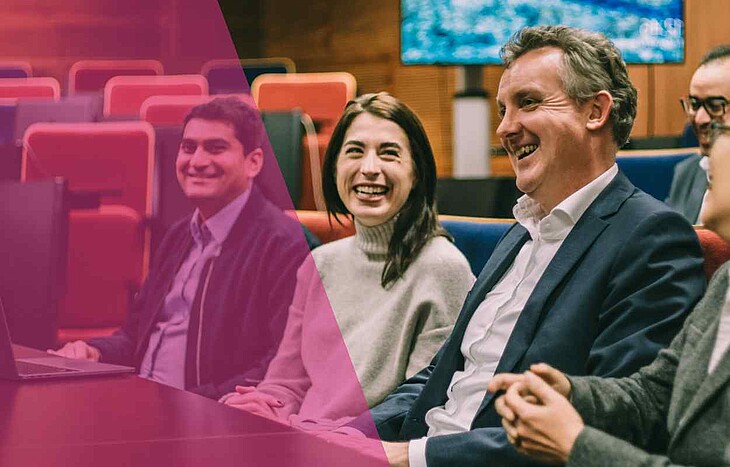

Every team needs to develop. Business does not sit still for any organisation, and your company must foster effective, collaborative teams to stay ahead of the curve. Hybrid working, the growth of a skills economy, and the rise of an ageing workforce – these are challenges you will face at some point, and the strength of your team’s capabilities has never been more vital to the success of an organisation.
Rotterdam School of Management, Erasmus University (RSM) designs and implements team development programmes for industry leaders like you. It’s down to this experience that we can assess what is needed to ensure your teams can thrive long term.
Perhaps you’re interested in implementing a new team development programme in your organisation. Or maybe you’re looking for in-company training for your team. Whatever your situation, we’ve created a guide to help you understand team development before you embark on your organisational learning journey.
Team development is the process of strengthening the effectiveness of an organisational team or department, collectively improving both soft and hard skills through a learning and development programme.
Team development is not team building. Whereas team building focuses on building team cohesion,team development programmes goes further, strengthening cohesion and targeting the core capabilities of the team, developing skills that lead to more efficient progression towards organisational goals.
Just like a winning sports team will never stop training, a truly great team will never stop learning. This is this fundamental idea underpinning team development programmes. From top-to-bottom, we design our team development programmes to train your team, just like a sports team, to function better and to stay ahead of the competition.

There are many benefits to investing in effective team development programmes. As a manager, you are most likely aware of what a team development programme can do for your team and your organisation. With benefits such as building key team skills, strengthening team cohesion, developing leadership capabilities and fostering team loyalty and identity.
Having entered a new skills economy, you can see that growth is fuelled by vital soft and hard skills. The future of success at work is centered around how well your organisation can develop skills and adapt to change. Team development programmes hold the key to unlocking the potential of your team and can teach valuable skills that can create long-term value for your organisation.
As an effective manager, you balance each team member’s individual skill levels. Every member has their own unique background, knowledge and set of capabilities. RSM team development programmes are specifically designed to upskill and reskill your team, so that they can share a common foundation of knowledge and ability. This improves the overall cohesion of your team and increases the efficiency of team processes and function.
Your ability to direct, inspire and develop people makes you a good leader. As such, you know that team development programmes teach relevant hard skills for organisational teams and instil holistic leadership capabilities. Communication, collaboration and emotional intelligence are all sharpened throughout the team development process, along with a greater understanding of what makes a team succeed.
Through implementing a team development programme, you invest in a programme and in your team. With our collective learning methods and by sharing a common learning path, your team members gain a better understanding of each other and themselves. This builds better relationships, and creates a stronger identity within the team. It’s this team loyalty and identity that reduces turnover, increases wellbeing and has an overall positive impact on your workforce.
Development programmes designed for individual employees can also be applied to entire teams. In-company training brings the ease of implementation and skill training of short courses, such as those provided at RSM, and applies them to an entire team in-company.
Customised programmes are team development programmes, built from the ground-up to address specific organisational needs and challenges. A customised programme is truly unique to your business. It’s a process of co-creation, meaning that the learning process is built both by the organisation and by a learning partner such as RSM.
Mentoring, or coaching, involves the knowledge of an individual mentor, such as an expert practitioner or leading researcher. This knowledge is passed down onto multiple members of a team. Using a more individual approach, relationships are built between the mentor and mentee over time, so that the mentor can oversee personal growth across the team.
Our results show that team development is particularly effective when applied to an entire leadership team, as their own learnings can affect the entire organisation. RSM leadership team training can target certain weak points, build new capabilities or foster overall cohesion within the leadership team.
It’s vital that team development renders a solid return on your investment. A great team development programme should deliver results that you can measure, so you can evaluate the effectiveness of your efforts.
There are countless methods to evaluate a team development programme, from staff surveys to one-on-one reviews. What’s most vital, regardless of which data-gathering method you choose, is that you establish a baseline of comparison and quantifiable goals before the programme begins. Depending on the capabilities being taught, it’s important that you formulate a concrete idea of what you want to achieve from the training. When you establish this from the start, the impact of your team development programme can be better understood.

Embarking on a team development programme requires an investment of finances, time and effort. This investment is of the utmost importance when competing in today’s uncertain business environment. To stay ahead, team development must not be an afterthought. Rather, it should be central to the long-term growth strategy of your organisation.
Take the first steps for you team’s learning journey, and read more about our customised programmes, designed for team success.

Key Account Manager

Key Account Manager

Key Account Manager